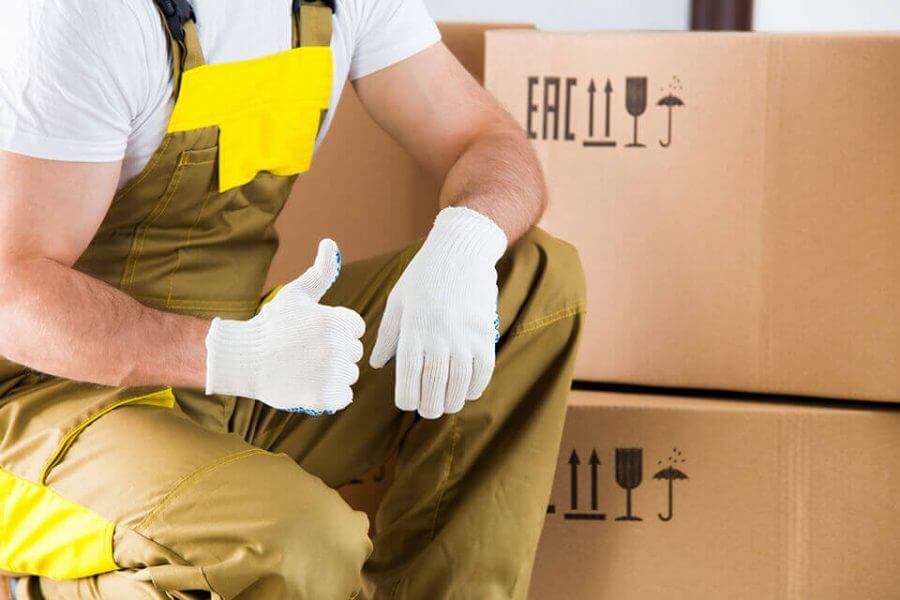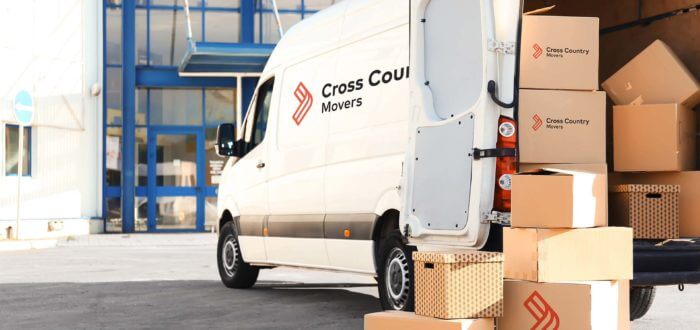

How to Recognize and Avoid Moving Scams
Posted in Moving Tips & Tricks on November 4, 2020
According to the statistics, over 99% of all cross country moves end successfully and safely, but any time a customer has a negative experience, that one time is too many. If you’re moving soon, no one guarantees that you won’t fall victim to moving scams. Luckily, there are many ways to recognize them on time and postpone your relocation, or deal with them in another way.
There are numerous different ways scammers can undertake a fraudulent and unlawful transaction against the customer. These frauds can range from higher post-move expenses to damage or total loss during the move. Fortunately, you’ll learn how to handle everything properly and prevent possible relocation fraud with our tips and tricks.
Types of Moving Scams
Why is it important to recognize swindles on time and choose a removal company carefully? Because otherwise, your relocation can turn into an overpriced agony. So, you should be familiar with the following types of moving scams in order to protect yourself from potential deceptions in the future:
- A removal company that never shows up after receiving a deposit
- Those who give you a lower estimate, but charge you more afterward
- People who look like real relocation professionals in the beginning, but after packing a moving truck with your goods, they never show up at your new destination.

Is It Better to Move Yourself or Hire Cross-Country Movers?
It might seem that opting for DIY might be a better choice, but that’s only at first glance. Self-moving can be attractive due to its potential affordability, but people usually overlook one factor – you’ll need to expend significant effort and time to move by yourself.
In addition to creating a moving to-do list, you should deal with an accurate relocation budget and make a household inventory list. But, that’s only the tip of the iceberg of your relocation tasks. Don’t forget to pack the moving essentials and find the most efficient method to pack clothes for your move. On top of that, if you need to, for example, move a piano, you’ll realize that self-moving will cost more than you expect. If going DIY, you’ll need to deal with everything – from the logistics of packing a large truck to figuring out how to pack fragile items.
So, if you want to save time, energy, and nerves, consider full-service movers. You can also opt for a compromise – to pack and load everything yourself, and the removal firm transports your items.
If you’re wondering, Who is the best moving company?, just keep in mind that you should do research about your prospective long-distance movers and their responsibilities. When you find a reliable, professional, and trustworthy firm know that they will be able to provide you with all the necessary cross country moving services. Whether you need a temperature-controlled storage unit, auto shipping, or packing services, respectable pros have all. And don’t forget to tip your movers after a job well done.

What Are Things You Should Watch Out for When Planning on Moving Across the Country?
When choosing the best cross-country moving company, it might take some time to pick several that fulfill your needs. But, if you know what essential factors to consider, your search shouldn’t be so demanding. So, before we start with the prevalent relocation swindles you should avoid, let’s find out what are the things you should take into account when choosing the movers to your liking:
- The reputation of the mover
- Reviews about the removal firm online
- Whether movers are licensed (they have to be)
- The movers’ rates
- Overtime charge.
Once we’ve determined what are important elements of good relocation, it’s time to find out if a mover is a scam. Needless to say, that should be determined before you pay a dime or sign a contract.
Company Isn’t Licensed Through the FMCSA
If your mover is not licensed through The Federal Motor Carrier Safety Administration (FMCSA), you should be concerned. This federal agency’s job is regulating interstate moving companies. So, if your potential mover is not properly licensed through the FMCSA, it’s probably a scam.
But, how can you check on this before your relocation?
A USDOT (US Department of Transportation) number is something that every professional removal firm has. You can find it on your company’s website and use it to search the FMCSA’s database for any additional information you would like to know.
Moving Fraud Tools Used By Many Companies: Non-Determined Prices and Extra Costs
Before you sign the contract, you would probably like to know how much do movers cost. With a reputable mover, price is a matter of your mutual agreement based on the weight of your shipment and other specifics. Thanks to customer reviews, you can determine whether movers charged them more money than they agreed to. Still, if judging according to the reviews, make sure to read reviews on multiple sites and don’t rely on star ratings only – read the reviews and find out the most reliable way to get the initially arranged price.
Most Common Moving Scams – Charging By Cubic Foot
When people relocating long-distance, they want to know Do movers charge by weight or volume? Trustworthy and legitimate professionals, especially state to state movers, will charge based on your cargo’s weight that will be loaded onto the truck. If you get an estimate based on volume, be on your guard.
Company Asks You to Sign a Contract or Pay for Services Before It Does an In-Home Estimate
Every professional mover will not ask you money or to sign anything until they do an in-home estimate. Doing this, they can precisely assess how much all your freight will weigh. If a mover skips this step, you should beware – it’s probably a scam.
Still, keep in mind that many removal companies give preliminary quotes over the phone or even online in order to provide you with an idea of how much your move might cost. But, it shouldn’t be a replacement for an on-site inspection, which is usually done by an estimator. He will come to your place, inspect everything you’re relocating, and provide you with an updated estimate.
So, if your movers try to skip the in-home estimate and demand from you to sign a contract and pay them upfront, this is a clear sign that you are dealing with fraudsters.
Lack of Attention to Detail Can Be the Sign of a Moving Scam
Once you’ve compiled a list of possible cross country movers, the next step will be to give them a call. You can search for their website and look for the phone number, but sometimes you won’t be able to find it because it doesn’t exist. Put simply, scam artists usually don’t play a long game. They set up websites and make up their names that they abandon quickly. But first, their goal is to scam a few customers.
Also, scammers usually want your phone number, but they won’t give you theirs. And when speaking with someone from your potential removal firm, pay attention to the questions they ask you:
- The size of your home
- When you are planning to move
- Where you are relocating to and from.
So, if these are questions you get, you can rest assured that you’ve chosen the right long-distance moving company for your relocation.
Other Oddities Related to Possible Moving Scams
You can come across the perfect movers who did everything right from your first phone call to the in-home estimate. But, just as you thought you would reach your desired location with them and leave your valuables to this company, some warning signs can help you realize that everything isn’t as it should be. Let’s find out what are other oddities you should beware of.
Suspicious Bids
When it comes to the legitimate long-distance movers, they will offer you proper relocation estimates, unlike the scammers whose bids are usually weird and too good to be true. Here are bids you should always be suspect:
- The law-ball bid – it requires additional research to find out if some important detail is missing before signing a low-cost relocation agreement
- The volume-based bid
- The phone-based bid
- The in-and-out bid
- The handshake bid
False References
Many companies have their websites filled with fictitious testimonials to pull the wool over prospective customers’ eyes. That’s why you should read online reviews from websites they don’t control, check the Yellow pages, or research the company through the Better Business Bureau (BBB) or American Moving & Storage Association (AMSA).

Best Rules for Handling Moving Company Scams When Moving Cross-Country
So, how to handle scam movers? Your common sense and gut feeling should be the most relevant factors when choosing a reliable removal firm. You need to keep your eyes open and be critical of details. Also, do thorough research before you accept or sign anything. To take precautionary measures, you should follow these rules:
- Get a written contract and never sign a blank agreement
- Read the terms and conditions of the agreement (don’t skip a fine print)
- Confirm that insurance coverage and terms of claiming it are included in the contract, especially when you pay for full value protection
- Check the license with federal institutions and other authorities
- Understand the limits of responsibility and the denial of it
- All dates should be specified (pick-up and delivery)
- Be free to ask anything that you find unclear

What to Do if You Have Been Scammed by a Long-Distance Moving Company
If you choose responsible professionals, your relocation will be stress-free. You can achieve that by being informed and cautious. But, sometimes, if you are in a hurry and need to organize a last-minute move, bad things can happen. If you’ve chosen moving scammers without knowing it, you’ll very soon realize that your relocation turned into fraud. If your goods were badly damaged, lost, stolen, or held hostage, your movers were late, or you were overcharged, you can opt for a formal complaint.
So, what are your rights? You can officially file and report moving fraud in several ways:
- Contact your movers and file a complaint
- Write an online review – your negative review can have catastrophic effects on your company
- Take your case to a small claims court and seek financial reimbursement
- File complaints with relevant organizations
Institutions and Associations That Can Protect You Discover Scamming Cross-Country Moving Services
There are several relevant associations you can contact or file a complaint to in order to prevent possible damage or initiate an investigation of the fraudsters:
- Better Business Bureau (BBB) – their team can assist in communication between you and your long-distance movers
- Department of Transportation (DOT) – they can help investigate certain types of moving swindles
- American Moving and Storage Association (AMSA) – it can help if you had an issue with the quality of services or had experiences with delays
- Federal Motor Carrier Safety Administration (FMCSA) – if you choose FMCSA, your complaint can help protect other people from moving scams because this organization keeps all complaints in its large database using them to conduct investigations.
FAQ
How Do I Identify a Moving Scam?
Moving scams may be difficult to identify, as the companies involved often use tactics designed to deceive their customers. However, there are some warning signs that can point out that the company you’ve contacted isn’t trustworthy:
- They require full payment prior to providing any services,
- They offer unusually low rates for long-distance moves,
- They won’t provide an in-home survey,
- They don’t have the proper licensing or insurance coverage,
- They do not have their own trucks but instead subcontract with other companies to move your items,
- They require unusually large deposits,
- They have unprofessional or unresponsive customer service,
- They won’t provide references upon request.
What Should I Look Out for When Hiring a Moving Company?
Check online reviews and ask for recommendations to ensure you are hiring a reputable and trustworthy company. Also, make sure the company is licensed and insured to protect your belongings during transit.
Get multiple quotes and compare prices to ensure you are getting a fair deal and consider what services the company offers, such as packing, storage, and car shipping. Ensure the company you choose has good communication and customer service, and that they are responsive to your questions and concerns. In the end, carefully review the contract and agreements before signing, to ensure you understand all the terms and conditions.
How Can I Ensure the Moving Company I Hire Is Legitimate?
Look for online reviews and check the company’s website and social media profiles. You can also check the Better Business Bureau to see if there are any complaints or negative reviews about the company. At the same time, make sure the company is licensed and insured by checking the U.S. Department of Transportation’s Federal Motor Carrier Safety Administration (FMCSA) website or calling the FMCSA. Of course, keep in mind that you can always ask for referrals from friends, family, or coworkers who have recently moved.
What Should I Do if I Suspect a Moving Scam?
Contact the relevant authorities, such as the Federal Motor Carrier Safety Administration (FMCSA), the Better Business Bureau (BBB), and local law enforcement. Collect any documentation, such as emails, contracts, and receipts, that may be useful in investigating the incident.
Also, don’t neglect to spread the word about your experience to others in your community to help prevent others from falling victim to the same scam. If you have suffered significant financial loss, consider seeking legal assistance to recover your losses.
How Do I Protect My Belongings During a Move?
First of all, hire a reputable and insured moving company with a good track record of handling customers’ belongings with care. Then, make a list of all the items you are relocating, including their condition, to help you track your belongings and ensure nothing is lost or damaged.
Be present during the packing process to ensure that all your belongings are handled carefully and packed securely and consider purchasing moving insurance to protect your belongings in case of damage or loss during transit. Don’t forget to get a written agreement with the movers that outlines the terms and conditions of the move, including their responsibilities and the cost of the move.
How Do I Avoid Overpriced Moving Quotes?
Get quotes from at least three different moving companies to compare prices and services, but don’t forget also to check the reputation of the moving companies by reading online reviews, checking with the Better Business Bureau, and asking for referrals.
Make sure you understand what is included in the quote and what is not. Some moving companies may charge additional fees for packing, insurance, and storage. Be wary of companies that require a large deposit or full payment upfront, as this can be a sign of a scam. Of course, make sure the quote, services offered, and the terms and conditions are in writing and that you have a signed contract with the moving company.
What Are Common Red Flags for Moving Scams?
Common red flags for moving scams include:
- Unusually low estimates,
- Requiring payment upfront,
- No license or insurance,
- Fake reviews,
- Lack of communication,
- Unprofessional behavior.
How Do I Make Sure I Get a Fair Price for My Move?
Obtain quotes from different moving companies to compare their offer and prices. Provide the long-distance movers with a detailed list of your belongings, the date of the move, and any special requirements you have. This will help the company provide an accurate quote. Also, check the reputation of the moving companies to determine if they are legitimate businesses.
Relocation prices can vary depending on the time of year, with summer being the busiest and most expensive season – so keep that in mind. However, don’t be afraid to negotiate with the company for a better price, especially if you have obtained multiple quotes.
How Do I Find a Reputable Moving Company?
Ask friends, family, or colleagues for recommendations of companies they have used and trust, but also check online reviews and ratings of the companies you are considering on websites such as the Better Business Bureau (BBB) and Yelp.
Once you narrow your choice, make sure the moving company is licensed and insured. You can check the licensing information on the Federal Motor Carrier Safety Administration (FMCSA) website. Look for a company with a good track record of experience in cross-country moving. In the end, get everything in writing.
What Steps Can I Take To Avoid Falling Victim to a Moving Scam?
Make sure you thoroughly investigate the reputation of any moving company that you are considering hiring, including reading online reviews and checking the company’s credentials with licensing and insurance bodies. Ask for a detailed written estimate from each company you consider, which should include services offered, estimated dates of delivery and pickup, an itemized list of items to be moved, and the total cost for all services.
Always make sure all agreements are in writing before you sign anything or pay any money. This should include a binding contract outlining all fees and services that will be provided by the movers. Be wary of any company that insists on cash payments or asks you to sign blank documents, as this can be a sign of potential scams. Additionally, never give out your financial information over the phone or online without verifying the legitimacy of the company beforehand.



